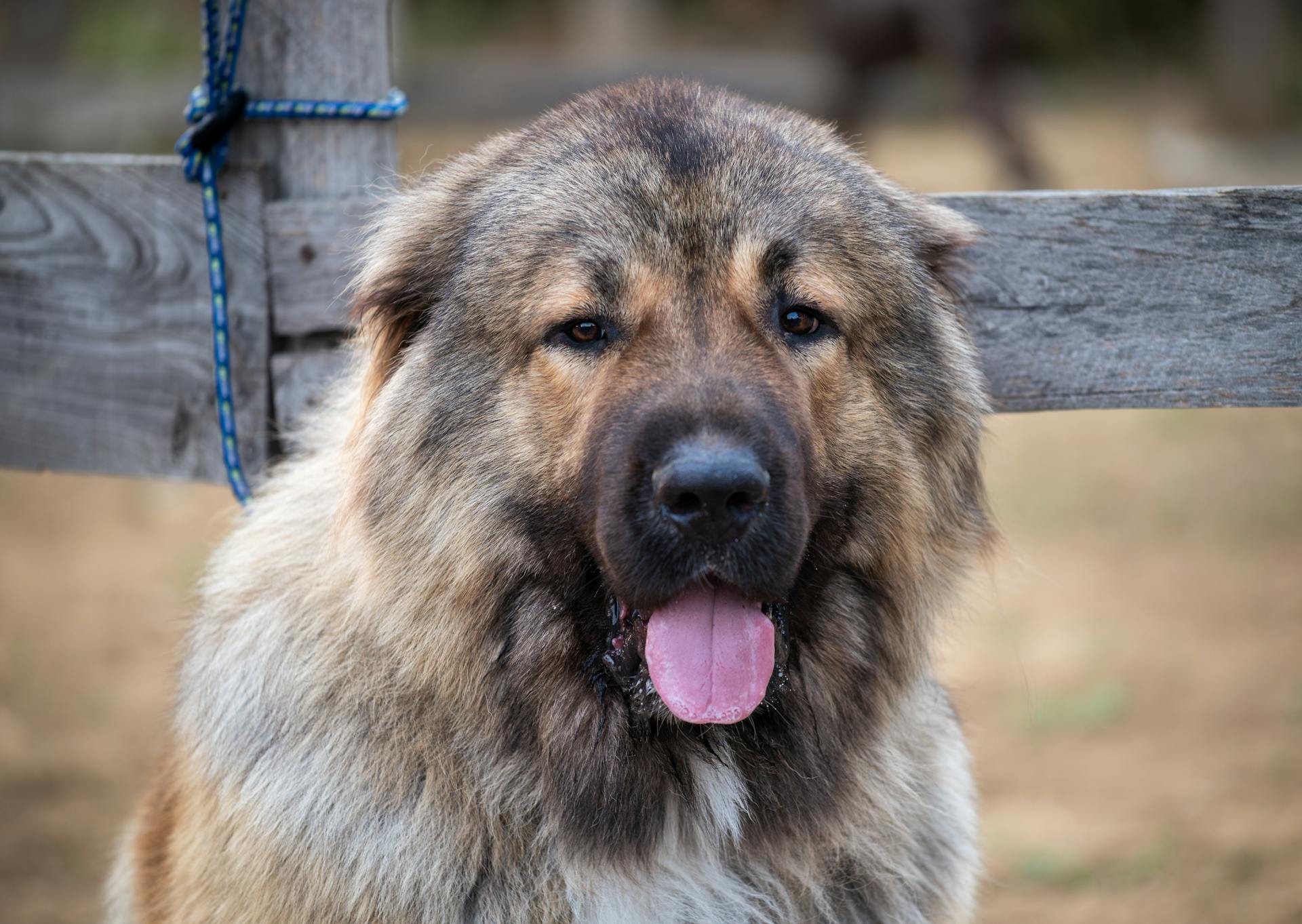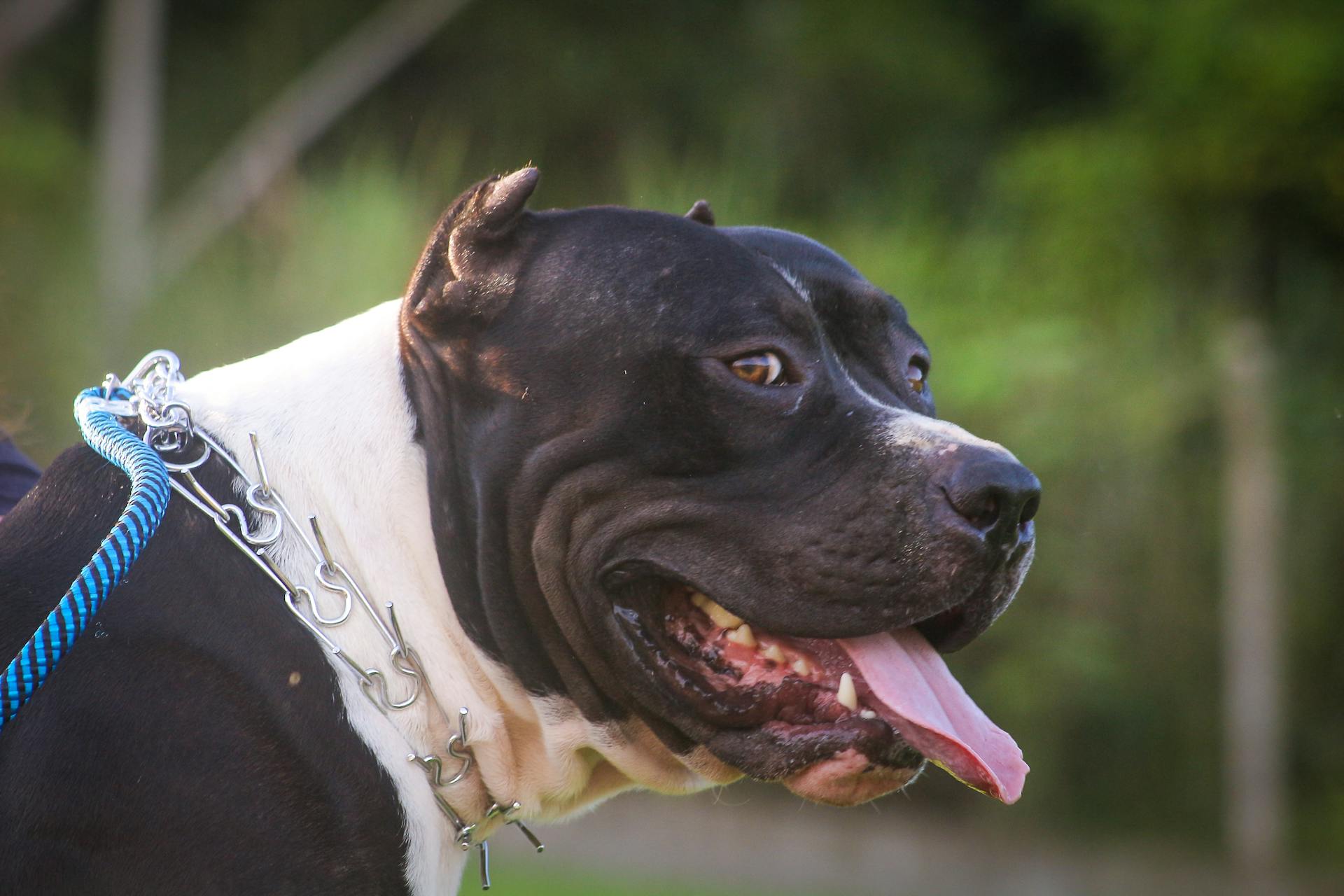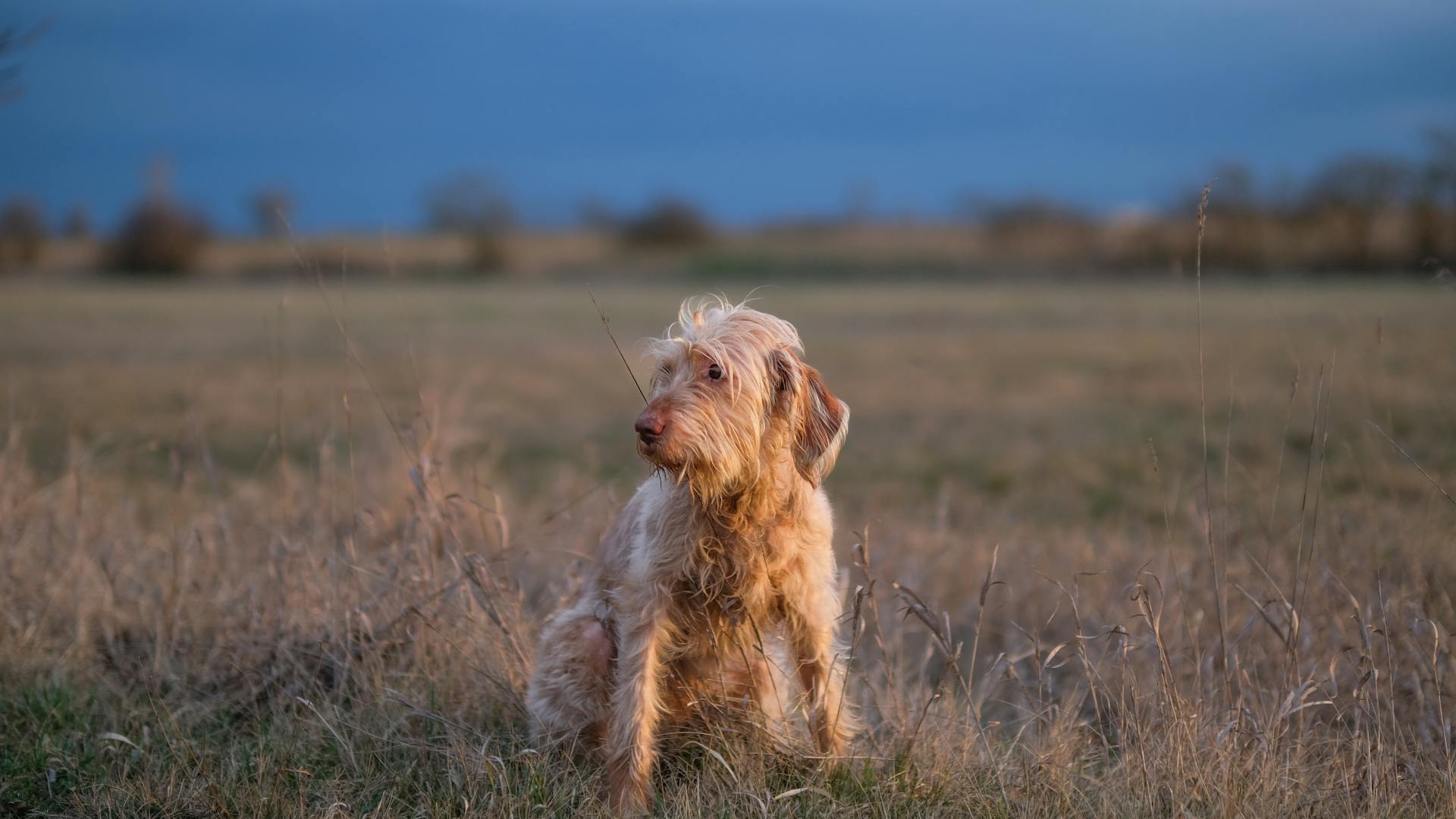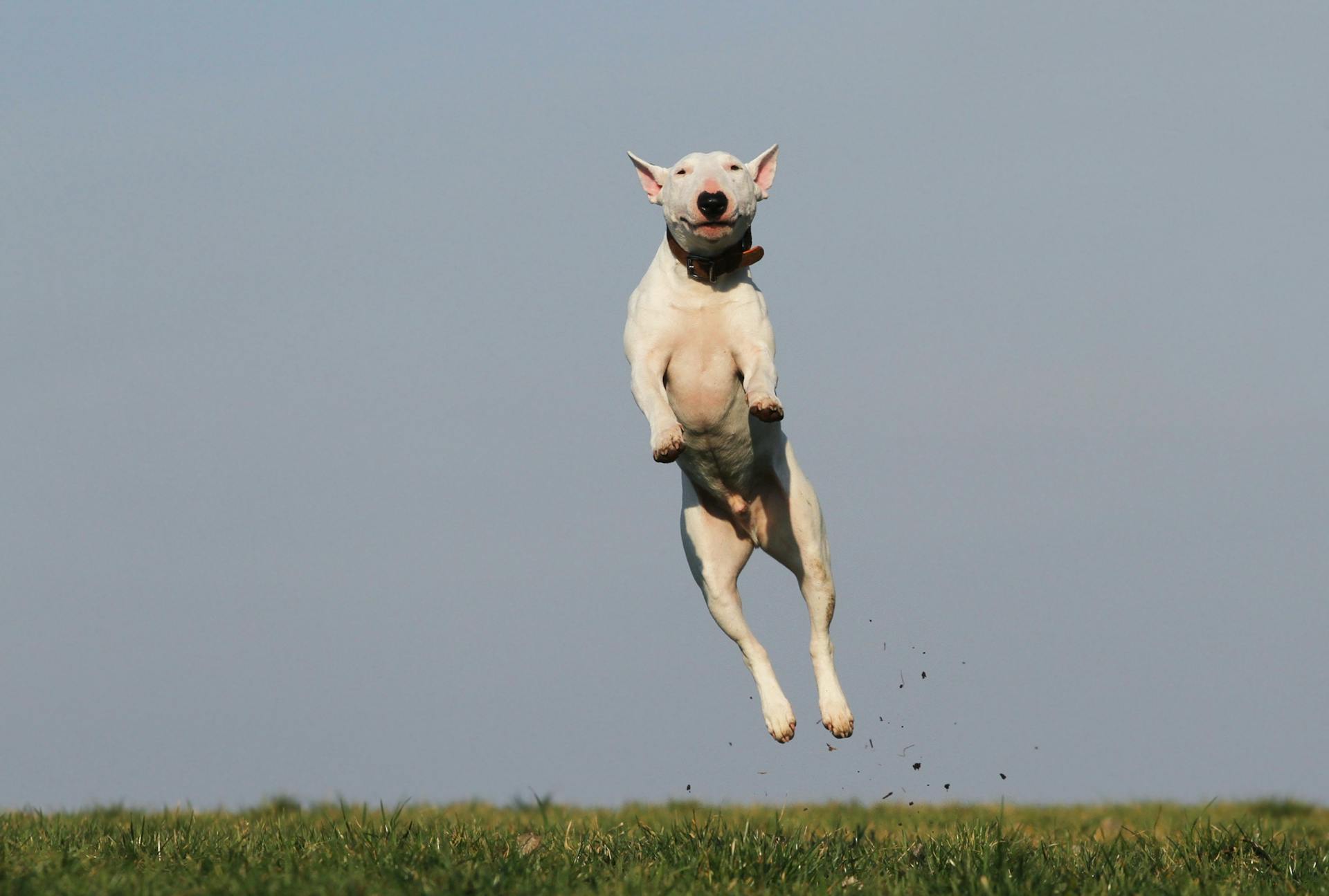
Cane Corsos can be a handful if you're not prepared for their strong will and high energy levels. They were originally bred as guard dogs and hunting companions, so they have a strong prey drive and may not be suitable for homes with small pets.
In terms of aggression, Cane Corsos are not inherently more aggressive than other breeds. However, their protective nature can sometimes get the best of them, leading to biting incidents.
Their intelligence and loyalty make them great companions, but they require consistent training and socialization from an early age. Without proper training, they can become stubborn and difficult to manage.
Their size and strength can be intimidating, but with the right handling and care, Cane Corsos can be loving and gentle family pets.
Worth a look: Pit Bulls Are Not Dangerous
Temperament and Behavior
Cane Corsos are naturally protective and alert, making them great watchdogs. They have a strong instinct to defend their family and property.
Their loyalty is unwavering, forming deep bonds with their families and being fiercely loyal companions. This loyalty can sometimes be misinterpreted as aggression, but it's essential to remember that they're just trying to protect what's theirs.
If you don't take charge, a Cane Corso will take the lead, so consistent leadership and training are crucial. They're intelligent dogs who are eager to please their owners, making them highly trainable with the right approach.
A Cane Corso's behavior depends on how they've been raised since puppyhood, so it's essential to research a reputable breeder and work with them to find a puppy that fits your lifestyle.
Characteristics
The Cane Corso is a majestic breed, and understanding their characteristics is essential to being a responsible owner.
Their height is quite impressive, with males reaching 24–28 inches and females reaching 23–26 inches.
The Cane Corso's weight is also noteworthy, with males weighing between 99–110 pounds and females weighing between 88–99 pounds.
With a lifespan of 10 – 12 years, you can expect a long and loving relationship with your Cane Corso.
Personality and Behavior
Cane Corsos are naturally alert and watchful, bred for centuries as guardians. They possess a strong protective instinct towards their family and property.
Their loyalty is unwavering, forming deep bonds with their families and being fiercely loyal companions. This loyalty can sometimes manifest as possessiveness, especially when it comes to their family.
With the right approach, Cane Corsos are highly trainable due to their intelligence and eagerness to please. They thrive on consistent leadership and clear boundaries.
Their confident and independent streak can sometimes lead to dominant behavior, especially if not addressed from an early age. Finding a reputable breeder who breeds for less aggression is essential.
Cane Corsos can be loving towards and protective of children when properly raised, trained, and socialized. However, they may associate children with prey if they're not socialized correctly.
Running and squealing can trigger their protective instincts, making it essential to keep them confined when kids run outdoors. A solid, secure fence is a must to prevent them from leaving your property.
Teaching children how to approach and touch dogs is crucial, and supervising interactions between dogs and young children is a must to prevent biting or ear or tail pulling.
Take a look at this: What Age Do Cane Corsos Stop Growing
Training and Socialization
Cane Corsos are highly trainable due to their intelligence and eagerness to please their human parents. Consistency and patience are key when training them. Positive reinforcement training techniques are ideal for building a strong bond and fostering obedience.
Their intelligence allows them to learn quickly, but they require a firm hand and are not recommended for first-time dog parents. Socialization is of primary importance for Cane Corsos from a young age, and basic obedience training is essential in any large breed canine.
Cane Corsos can be aggressive or even dangerous if not properly socialized or if abused by their owner. However, this can be prevented with proper training and socialization.
Here are some essential steps to ensure your Cane Corso remains non-aggressive:
- Start socialization early, as behaviors are learned early in this intelligent breed.
- Start obedience training as early as possible, as your Corso becomes large, fast, and more challenging to handle in adolescence.
- Teach bite inhibition from early puppyhood by firmly and gently removing all contact when your puppy bites in play.
- Show your pup strong leadership early on, such as sitting before meals and waiting before you allow them outdoors.
- Continue to socialize your Corso through their lives, not only as a puppy.
- Promptly curtail dominant behavior towards humans and other dogs by using obedience commands to sit or lie down.
- Never encourage protective or aggressive behavior in your dog, as this will encourage them to further aggression.
Early acclimation to grooming procedures is key, and handling their paws, examining their mouth and ears, and rewarding good behavior during grooming sessions will set the stage for stress-free veterinary exams and handling throughout their lives.
Potential Challenges
Cane Corsos are large dogs, and apartments might feel cramped for them. They require plenty of daily exercise (at least an hour) to burn off energy and prevent destructive behavior.
Their protective nature can lead to barking at noises or unfamiliar sights outside the apartment, which might disturb neighbors. This is not inherently aggressive behavior, but rather a natural response to their surroundings.
Early socialization from a young age is crucial to prevent them from becoming wary or fearful of unfamiliar people. This can help them become well-adjusted around new people and other animals.
- Bloat
- Gastric Dilatation-Volvulus (GDV)
A Cane Corso's bite force is an estimated 700 PSI, so proper training and socialization are essential to prevent aggression. If owners don't fulfill their pet parent responsibilities, their Cane Corso can become aggressive.
What Does Mean?
The breed's name has two possible origins for "Corso." One theory suggests it comes from "cohors", translating to "bodyguard", reflecting their protective nature.
The Cane Corso's impressive build is also hinted at in its name. "Corso" might also stem from the old Italian word "corsus", meaning "sturdy" or "robust."
Potential Challenges

Cane Corsos are large dogs that can feel cramped in apartments, making a house with a yard a better fit.
Their independent nature means they're not pushovers and require experienced owners who can provide consistent leadership. They can be stubborn if not trained properly.
Early socialization from a young age is crucial to prevent them from becoming wary or fearful of strangers. This helps them become well-adjusted around new people and other animals.
Cane Corsos require plenty of daily exercise (at least an hour) to burn off energy and prevent destructive behavior. Without enough exercise, they might become destructive.
Their protective nature can lead to barking at noises or unfamiliar sights outside the apartment, which might disturb neighbors. This is a common issue in apartment living.
Here are some potential health issues to be aware of:
- Bloat
- Gastric Dilatation-Volvulus (GDV)
A Cane Corso's strong will and independent nature require consistent training and boundaries. This helps establish the owner as the leader and prevents stubbornness.
Their guardian instinct makes them excellent watchdogs, but proper socialization is crucial to ensure they're well-adjusted around strangers and other animals.
Health and Wellness
Cane Corsos, like all breeds, have potential health concerns that responsible breeders prioritize genetic health testing to minimize. This proactive approach ensures healthy bloodlines and reduces the risk of inheritable health issues.
Some common Corso health problems include heart disease, such as dilated cardiomyopathy, which affects the heart's ability to pump blood effectively. Degenerative joint diseases, like hip and elbow dysplasia, can cause discomfort and severe pain later in life.
If your Corso has a limited range of motion or a limp, hip and elbow dysplasia are the likely causes. A PennHIP screening can evaluate your Corso's risk of hip dysplasia, and reputable breeders prioritize genetic testing over a simple vet check.
Monitoring your Corso's weight can also go a long way as a preventative measure for joint problems. Allergies, such as food allergies or environmental allergens, can result in itchy skin, ear infections, and digestive issues.
Health Issues
As a Cane Corso owner, it's essential to be aware of the potential health concerns that can affect your furry friend. Like all breeds, Cane Corsos have potential health issues that responsible breeders prioritize genetic health testing to minimize.

Responsible breeders prioritize genetic health testing to ensure healthy bloodlines. They verify clearances from puppy's parents and don't just rely on a simple vet check.
Cane Corsos are prone to joint problems due to their size, which can cause discomfort and severe pain later in life. If your Corso has a limited range of motion or a limp, hip and elbow dysplasia are the likely causes.
Here are the common joint problems that affect Cane Corsos:
- Hip Dysplasia
- Elbow Dysplasia
Monitoring your Corso's weight can go a long way as a preventative measure. A PennHIP screening can evaluate your Corso’s risk of hip dysplasia, so make sure to verify hip dysplasia clearances from puppy's parents.
Heart disease is another concern for Cane Corsos, with dilated cardiomyopathy being a common condition. This affects the heart's ability to pump blood effectively throughout the body, so it's crucial to be aware of the signs and seek veterinary care right away.
Treatment for joint and heart issues can include pain and anti-inflammatory medications, joint supplements, physical therapy, and even surgery.
Allergies
Allergies can be a challenge for Cane Corsos, causing itchy skin, ear infections, and digestive issues.
The Corso can develop allergies to food ingredients, environmental allergens such as pollen or dust mites, or both.
It's essential to work with a responsible breeder who prioritizes the health and well-being of their dogs.
A simple vet check isn't enough to ensure the health of your future furry companion - responsible breeders rely on genetic testing to minimize the risk of inheritable health issues.
Genetic testing helps identify potential health problems early on, giving you a better understanding of what to expect and how to care for your Cane Corso.
By choosing a breeder with written health testing documentation, you can reduce the risk of allergies and other health issues in your future companion.
Owning a Cane Corso
Owning a Cane Corso requires serious consideration, as they are a serious dog breed that demands firm but loving guidance. They are not a good fit for every family, especially those with small children.
Cane Corsos are naturally protective of their family, but this can sometimes be misconstrued as aggression. They view strange animals as prey, so socialization is crucial to teach them to remain calm in the presence of other dogs.
To ensure a harmonious household, it's best to have a Cane Corso as a family-only dog, and teach children proper behaviors around their pets. This will help prevent any misunderstandings that might lead to conflicts.
Recommended read: Are Cane Corsos Good Family Dogs
Purchasing
Purchasing a Cane Corso puppy requires careful consideration, as there are some breeders who use misleading marketing tactics to inflate their prices.
The name "King Cane Corso" is just a marketing gimmick, and there is no official designation for such a dog. This means that breeders who use this term might not be prioritizing the health and temperament of their puppies.
To find a reputable breeder, look for one who adheres to established breed standards for Cane Corsos. These standards outline the size, proportions, and other characteristics of the breed.
Avoid breeders who use terms like "King Cane Corso dogs" as it might not be a reliable indicator of quality. A reputable breeder will focus on the health and temperament of their puppies.
Additional reading: King Corso Pit Bulls
Owning a Banned Item
Some cities and states in the US have Breed Specific Legislation (BSL) that restricts, regulates, or prohibits ownership of Cane Corsos. These states are Alabama, Arkansas, Colorado, Idaho, Kansas, Nebraska, South Dakota, and Washington.
The United Kingdom's "Dangerous Dog Act" didn't ban Cane Corsos as of December 2023. However, many Cane Corso owners feel this might be a pretext for a ban to eventually happen.
Other European countries like Denmark, Norway, France, and Malta have varying degrees of restrictions on owning Cane Corsos.
Family Compatibility
Owning a Cane Corso can be a wonderful experience, but it's essential to understand their family compatibility. They are a serious dog breed that requires serious attention and care from their owners.
The Corso is not a social butterfly and will not buddy up with just anyone. They have no interest in people or other animals outside of their family, but those within the family will have their undivided loyalty and protection.
To ensure a harmonious household, it's crucial to teach children proper behaviors around their pets. Cane Corsos may misconstrue play fighting or rough behaviors as a threat, so it's essential to supervise interactions between children and the dog.
Cane Corsos are not suitable for families with small children or toddlers due to their size and temperament. If you're considering bringing a Cane Corso home, it's best to wait until your children are old enough to understand and respect the dog's boundaries.
Socialization is key when it comes to introducing a Cane Corso to other pets. They may get along with other dogs or cats if raised with them, but it's essential to teach them to remain calm in the presence of other dogs. If you get a second dog, it's best to choose one of a different sex.
Safety and Security
Cane Corsos are naturally protective of their human family, assessing potential danger before attacking an intruder.
Their loyal nature and proactive instincts make them more likely to attack an intruder who exhibits threatening behavior.
As Cane Corsos mature, their protective nature becomes more pronounced, making them a formidable guardian.
However, a well-trained and socialized Corso will exhibit a watchful aloof stance to strangers, characteristic of the breed.
This means that owners who prefer a breed that exhibits friendliness towards non-family members may want to consider another option.
A Cane Corso's protective instincts are not something that needs to be instilled, but rather a natural part of their breed characteristics.
Their intelligence and loyalty make them a great choice for families who value their safety and security.
Pros and Cons
Cane Corsos can be a great addition to the right family, but like any breed, they have their downsides. They are generally a gentle and calm breed, but they can be wary of strangers and may require time to warm up to new people.
Their large size and powerful build can make them a formidable opponent if they feel threatened or scared. They are also prone to hip dysplasia, a common health issue in large breeds.
On the other hand, their short coats require minimal grooming, making them a low-maintenance choice for some owners. They are also relatively intelligent and easy to train with positive reinforcement.
However, their strong will and independent nature can make them challenging to manage for inexperienced owners. They need consistent training and socialization from an early age to become well-behaved adults.
Overall, Cane Corsos can be a wonderful breed for active families who are willing to provide the necessary care and attention. But for others, their needs may not be a good fit.
Sources
- https://dogtime.com/dog-breeds/cane-corso
- https://www.yourpurebredpuppy.com/reviews/canecorsos.html
- https://www.dogexpert.com/dog-bite-info-on-cane-corso/
- https://www.mastiffguide.com/are-cane-corsos-aggressive-or-dangerous.html
- https://dogtime.com/reference/143187-cane-corso-aggressive-dangerous-temperament-personality
Featured Images: pexels.com


